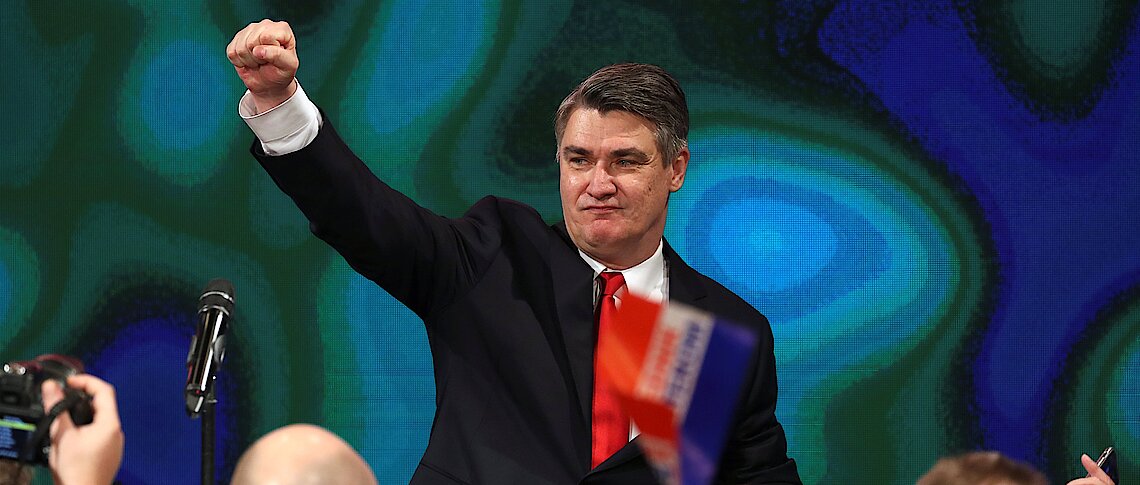Read this article in German.
Who would have thought that the promise of normality could be so attractive for voters: Zoran Milanović, a social democrat and former Prime Minister, won the presidential runoff election on 5 January 2020 in Croatia. With 52.7 per cent of the vote, he came ahead of conservative incumbent President Kolinda Grabar-Kitarovic with 47.3 per cent. Considering his lead of just under 3 per cent in the first round on 22 December 2019, hardly anyone had expected such a clear victory for the social democratic challenger who had run as ‘a president with character’.
Milanović managed to create a spirit of optimism in the country: with the slogan ‘normalno’, the promise to make Croatia a normal European country with normal citizens, and a pledge to fight corruption and nationalism, he won over many people from different camps. Such a promise can be so attractive to voters because of the cultural and political polarisation in this country of around four million inhabitants, which in 2013 was the last one to join the European Union.
Nearly 75 years after the end of the World War II, Croatian society continues to be divided between nationalists who see themselves in the tradition of the ultra-nationalist Ustaša movement, and those on the left who feel connected to the anti-fascist partisan movement. The clashes between these two antagonistic camps at all levels of society hold the country back from dealing with the future instead of the past.
Weaker right, stronger social democracy
Milanović’s campaign succeeded in winning over not only voters from the entire centre-left spectrum, but also a considerable number from the conservative camp – even a portion of the 24.5 per cent who had voted for Miroslav Škoro, the candidate of the extreme right, in the first round.
Milanović benefited from the fact that the Croatian Social Democratic Party (SDP) was able to overcome its intra-party quarrelling and the future direction of the party surrounding its leader Davor Bernardić. These factors inevitably led to the party’s slipping from the 33.5 per cent that it — and its smaller coalition partners — had received in the 2016 elections to just 17 per cent in early 2019. According to the latest polls, the SDP currently enjoys voter support of 25 per cent, and has thus caught up with the national-conservative government party ‘Croatian Democratic Community’ (HDZ).
It’s however equally important to note that Milanović’s victory results from the division of the right in Croatia. The HDZ itself has two wings: the moderately conservative one led by party leader and Prime Minister Andrej Plenković and the nationalist faction centred around former but currently disempowered party leaders.
Thus, Milanovic’s election is both the result of the split in the Croatian right and, possibly, a means of further weakening it.
Despite various attempts, Kolinda Grabar-Kitarović has not succeeded in winning over a sufficient number of nationalists and extreme right-wingers within and outside the HDZ. Of the 450,000 voters who voted for the third-strongest candidate Miroslav Škoro in the first round, only two-thirds participated in the runoff; of these, nearly 200,000 voted for Grabar-Kitarović and 100,000 voted for Milanović because they would go to great lengths to prevent Grabar-Kitarović from being re-elected.
In their view, she had squandered her chances by first presenting herself as a moderate and then later as a candidate for the nationalists. Because of this and numerous other mistakes, voters lost confidence in her. A considerable number followed Škoro’s recommendation to just add a third option on the ballot sheet and vote for the ‘Croatian people’. Consequently, over 4 per cent of the ballots had to be declared void, votes that could have gone to the incumbent.
Thus, Milanovic’s election is both the result of the split in the Croatian right and, possibly, a means of further weakening it. The internal party reckoning in the HDZ has already begun with mutual blame between the nationalist and moderate wing: ‘Many have done anything they could to prevent the HDZ from repeating its success in the 2014 presidential election,’ said Prime Minister and party leader Plenković.
This reckoning is mainly over the question of how much the party can follow his political course and, accordingly, how they view his chances for re-election. After this harsh defeat, political observers are expecting open internal power struggles, especially since the party must hold a convention with elections for party leadership by May. This means tough times ahead for Andrej Plenković.
A pragmatic president and neighbourly relations
Foreign and security policy played only a subordinate role in the campaigns of all 11 presidential candidates, even though the constitution explicitly grants the incumbent the right to shape foreign and security policy issues. There’s no question that Milanović is pro-European — the country joined the EU during his previous term of office.
In the televised debate, he scored points against his rival when asked which country was Croatia’s greatest friend, and he naturally answered ‘Germany’. Grabar-Kitarovic’s answer was the United States, which provoked disapproval in all quarters because, as is well known, it was based less on political facts than on her personal affinity with the country — she was an exchange student in the US.
With the election of Milanović, Croatian social democracy has shown that it is capable of winning elections again.
Nevertheless, Milanović has not been particularly enthusiastic about Croatia’s entry into the Eurozone and the Schengen area. His position is pragmatic. As he emphasised, it’s up to the current government — for example Croatia’s EU Presidency, which started on 1 January 2020. He wants to support the government — and along with it, its head — constructively in an advisory capacity.
Milanović also aims at pragmatic and normalised relations with the neighbouring countries in the region, above all Serbia, with whose president Croatia’s incumbent regularly exchanged verbal blows. Improvement in this area is sorely needed. This is where the new president can set a positive tone: especially as he’s someone who looks ahead and not back on the war years and, above all, believes in the power of the economy.
Despite all of the sabre-rattling, Croatia does a large part of its foreign trade with Serbia and there’s still great potential here. Milanović is well networked with political leaders in the region and enjoys trust. Since he withdrew from national politics in 2016, he has served as advisor to Albanian Prime Minister Edi Rama.
Perspectives for social democracy
With the election of Milanović, Croatian social democracy has shown that it is capable of winning elections again. Party chief Davor Bernardić is counting on the spirit of optimism to continue and give the SDP some tailwind to the upcoming elections in September 2020. Together with smaller parties from the centre-left spectrum, Milanović won the parliamentary elections in 2011 in a similar spirit of optimism and then formed a coalition government.
Whether he can or will help his party as president is an open question. In that office, he needs to act in a non-partisan fashion and wants to build bridges between the ideological camps. He certainly has what’s required, especially since he’s not an ideological leftist. During his presidency, he’s required to give up his membership in the SDP, where in any case he had not played a role in recent years.
Nevertheless, his personality could stand in the way: despite the conciliatory messages he sent out in all directions in his campaign, Milanović is still thought of by many Croatians as an outspoken politician who has cared little about the opinions of others, with a penchant for arrogance and operating on his own. In other words, as he himself describes his brand: a man of character.






